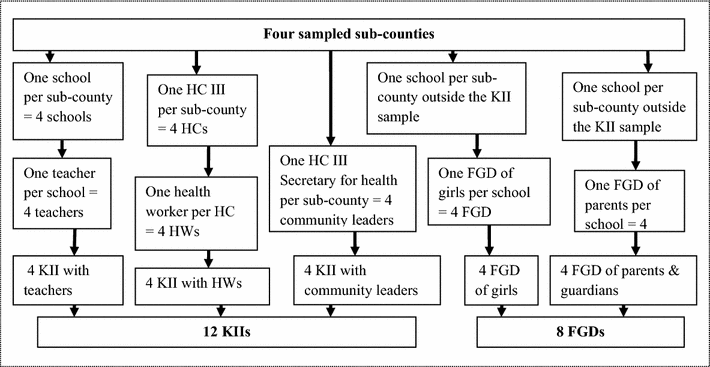Perceptions of human papillomavirus vaccination of adolescent schoolgirls in western Uganda and their implications for acceptability of HPV vaccination: a qualitative study
- PMID: 28854964
- PMCID: PMC5577844
- DOI: 10.1186/s13104-017-2749-8
Perceptions of human papillomavirus vaccination of adolescent schoolgirls in western Uganda and their implications for acceptability of HPV vaccination: a qualitative study
Abstract
Background: Human papillomavirus (HPV) vaccination has been perceived in diverse ways some of which encourage its uptake while others could potentially deter its acceptability. This study explored community member's perceptions about HPV vaccination in Ibanda district and the implications of the perceptions for acceptability of HPV vaccination. The study was conducted following initial vaccination of adolescent schoolgirls in the district between 2008 and 2011.
Methods: This qualitative study employed focus group discussions (FGDs) and key informant interviews (KIIs). FGDs were conducted with schoolgirls and parents/guardians and KIIs were conducted with school teachers, health workers and community leaders. Transcripts from the FGDs and KIIs were coded and analyzed thematically using ATLAS.ti (v. 6).
Results: The HPV vaccination was understood to safely prevent cervical cancer, which was perceived to be a severe incurable disease. Vaccinations were perceived as protection against diseases like measles and polio that were known to kill children. These were major motivations for girls' and parents' acceptance of HPV vaccination. Parents' increased awareness that HPV is sexually transmitted encouraged their support for vaccination of their adolescent daughters against HPV. There were reports however of some initial fears and misconceptions about HPV vaccination especially during its introduction. These initially discouraged some parents and girls but over the years with no major side effects reported, girls reported that they were willing to recommend the vaccination to others and parents also reported their willingness to get their daughters vaccinated without fear. Health workers and teachers interviewed however explained that, some concerns stilled lingered in the communities.
Conclusions: The perceived benefits and safety of HPV vaccination enhanced girls' and parents' acceptability of HPV vaccination. The initial rumors, fears and concerns about HPV vaccination that reportedly discouraged some girls and parents, seemed to have waned with time giving way to more favourable perceptions regarding HPV vaccination although the study still found that a few concerns still lingered on and these have implications for HPV vaccination acceptability.
Keywords: Acceptability; Adolescent schoolgirls; Perceptions about HPV vaccination; Qualitative study; Uganda.
Figures
Similar articles
-
Knowledge, perceptions and uptake of human papilloma virus vaccine among adolescent girls in Kampala, Uganda; a mixed-methods school-based study.BMC Pediatr. 2023 Jul 17;23(1):368. doi: 10.1186/s12887-023-04174-z. BMC Pediatr. 2023. PMID: 37461002 Free PMC article.
-
Effect of school-based human papillomavirus (hpv) vaccination on adolescent girls' knowledge and acceptability of the HPV vaccine in Ibanda District in Uganda.Afr J Reprod Health. 2014 Dec;18(4):45-53. Afr J Reprod Health. 2014. PMID: 25854092 Free PMC article.
-
Correlates of parents' reports of acceptability of human papilloma virus vaccination for their school-aged children.Sex Health. 2008 Dec;5(4):331-8. doi: 10.1071/sh08042. Sex Health. 2008. PMID: 19061552
-
Improving adolescent health: focus on HPV vaccine acceptance.J Adolesc Health. 2005 Dec;37(6 Suppl):S17-23. doi: 10.1016/j.jadohealth.2005.09.010. J Adolesc Health. 2005. PMID: 16310137 Review.
-
Acceptance of human papillomavirus vaccination and parents' willingness to vaccinate their adolescents in Ethiopia: a systematic review and meta-analysis.Infect Agent Cancer. 2023 Oct 11;18(1):59. doi: 10.1186/s13027-023-00535-6. Infect Agent Cancer. 2023. PMID: 37821992 Free PMC article. Review.
Cited by
-
Willingness to accept human papillomavirus vaccination in Jimma town, Ethiopia.Hum Vaccin Immunother. 2022 Nov 30;18(6):2125701. doi: 10.1080/21645515.2022.2125701. Epub 2022 Sep 26. Hum Vaccin Immunother. 2022. PMID: 36161874 Free PMC article.
-
Stakeholders' Understandings of Human Papillomavirus (HPV) Vaccination in Sub-Saharan Africa: A Rapid Qualitative Systematic Review.Vaccines (Basel). 2021 May 12;9(5):496. doi: 10.3390/vaccines9050496. Vaccines (Basel). 2021. PMID: 34065961 Free PMC article. Review.
-
Health Care System View of Human Papilloma Virus (HPV) Vaccine Acceptability by Emirati Men.Comput Math Methods Med. 2022 Jan 28;2022:8294058. doi: 10.1155/2022/8294058. eCollection 2022. Comput Math Methods Med. 2022. PMID: 35126638 Free PMC article.
-
Health systems constraints and facilitators of human papillomavirus immunization programmes in sub-Saharan Africa: a systematic review.Health Policy Plan. 2020 Jul 1;35(6):701-717. doi: 10.1093/heapol/czaa017. Health Policy Plan. 2020. PMID: 32538437 Free PMC article.
-
Involving men in cervical cancer prevention; a qualitative enquiry into male perspectives on screening and HPV vaccination in Mid-Western Uganda.PLoS One. 2023 Jan 27;18(1):e0280052. doi: 10.1371/journal.pone.0280052. eCollection 2023. PLoS One. 2023. PMID: 36706114 Free PMC article.
References
-
- Ogilvie G, Anderson M, Marra F, McNeil S, Pielak K, Dawar M, et al. A population-based evaluation of a publicly funded, school-based HPV vaccine program in British Columbia, Canada: parental factors associated with HPV vaccine receipt. PLoS Med. 2010;7(5):e1000270. doi: 10.1371/journal.pmed.1000270. - DOI - PMC - PubMed
MeSH terms
Substances
LinkOut - more resources
Full Text Sources
Other Literature Sources
Medical


